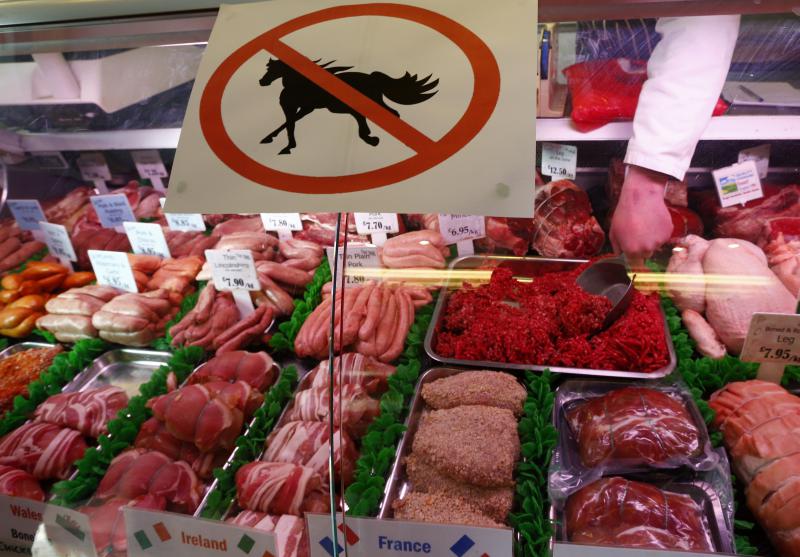Horsemeat supply chains are rife with animal abuse and traceability issues. Despite repeated scandals, EU consumers are still left in the dark as to the origin of the horsemeat they consume. It is high time for the EU to change this.
When thinking about horses, most people might visualise noble animals with their manes in the wind galloping on a beach, or else peacefully nibbling on grass in a field. As a species, we have a unique bond with these animals: throughout history, horses provided us with transport, ploughed fields, went to war with and died for us, and entertained us. To this day, horses are trained to compete in sports, used as working or therapy animals, or are kept for leisure riding and companionship.
Unfortunately, there is also a darker side to this relationship: the consumption of horse meat. In 2020, just under 60 million horses are recorded as livestock worldwide, with just over 5 million being slaughtered every year.
The EU imports annually more than 16,000 tonnes of horse meat, primarily from Latin America and Canada, to a value of ca €70 million. Ca 44,000 tonnes of horse meat is produced annually from horses slaughtered in the EU. While the number has been decreasing in recent years, ca 167,000 horses were slaughtered in 2020.
Throughout the years, Eurogroup for Animals and its member organisations, together with animal welfare NGOs based in producing countries, have gathered ample evidence of the serious animal welfare and public health issues associated with the treatment of horses destined for the meat trade in third countries.
The systematic abuse, mistreatment and neglect that NGOs have documented are abhorrent: inadequate transport conditions causing severe suffering; absence of shelter in the assembly centres; lack of veterinary care for sick animals, with many just left to die; falsified papers or non-existent veterinary treatment records; use of unskilled labourers that treat the horses roughly; appalling slaughter practises, including the slaughter of stolen horses and of mares exploited for the production of equine chorionic gonadotropin (eCG). These are not isolated incidents: we are talking about many detailed reports with countless pages of horror.
Lack of control of origin
In theory, most aspects of the EU Regulation on the protection of animals at the time of slaughter should be respected by all establishments exporting horse meat to the EU. The EU also imposes rules in terms of traceability.
Sadly, the European Commission itself confirmed, through several audits, that, most often, these basic rules on welfare and traceability of animals are not respected. Not only does this perpetuate animal abuse, but it also puts human health at risk as the meat from sick animals and animals treated with substances that are banned in the EU can enter the food chain due to insufficient official controls on food safety.
This lack of effective control measures is what already led the EU to suspend horse meat imports from Mexico in 2015 and those from Brazil in 2017. However, although the same or worse problems persist in many other source countries, the EU has not taken a similar decision and so far, this trade has continued unabated.
Tragic as this situation already is, there’s even more. From whichever angle we want to look at it, the horse meat trade is murky. A handful of European countries (Belgium, France, Italy an the The Netherlands) control the internal horse meat market and often re-export meat imported from Latin America, Canada and Australia alongside meat produced in the EU. Yet, European consumers are still being kept in the dark as to the origin of the horse meat they are buying, and this despite strong calls for mandatory country of origin labelling coming from consumers’ organisations.
Shortcomings in internal EU trade
What about internal trade? In 2020, it is estimated that ca 26,000 live horses were transported for slaughter intra-EU. As shown by a recent white paper produced by Eurogroup for Animals, the live transport of horses for slaughter presents serious challenges to animal welfare as well as posing risks for public health due to insufficient EU legislation on the matter.
To name but a few shortcomings, the training requirements for truck drivers are insufficient; the provisions on fitness for transport, space allowance and species-specific equipment are vague, unenforceable or inadequate, often causing severe and unnecessary suffering; the maximum transport times are too long.
Additionally, certain bureaucratic derogations put the traceability of the meat in jeopardy. In light of all this, it would be naive to suggest that all is well with animal welfare and food safety in intra-EU horse meat production. In reality, this is a long supply chain lending itself to many problems, including traceability issues, as seen with the scandals of 2013 and 2021.
This notwithstanding, even if consumers wanted to know where the horse meat they buy comes from, they couldn’t. With every purchase, chances are that European consumers are inadvertently supporting inhumane practises, violations of EU legislation, and possibly even organised crime.
As with many other forms of severe suffering inflicted to animals for human profit, first and foremost we have an obligation to address and improve existing conditions and empower European consumers to make informed decisions.
We believe that mandatory country of origin labelling for fresh and frozen horse meat would be a first big step in the right direction. Additionally, the EU should urgently suspend horse meat imports from all third countries in which there is no watertight system to ensure that EU rules on animal welfare on the farm, during transport, and at slaughter are respected. Clearly, if the EU and its Member States can't ensure safe horsemeat and reliable food information, then this meat should not be allowed to the market at all.
Beside all this, as animal protection NGOs we will continue to keep alive the ethical debate on whether we should continue to eat horse meat at all.


